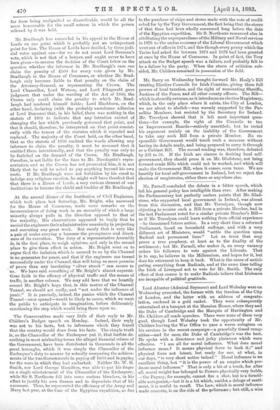Mr. Parnell concluded the debate in a bitter speech, which
left his general policy less intelligible than ever. After making the Parliamentary but perfectly useless points that Mr. Glad- stone, who supported local government in Ireland, was absent- from this discussion, and that Mr. Trevelyan, though now objecting to receive such a Bill from a private Member, had in the last Parliament voted for a similar private Member's Bill— as if Mr. Trevelyan could learn nothing from official experience- -he threatened future action. In a very short time a reformed Parliament, based on household suffrage, and with a very different set of Ministers, would "settle the question upon Radical and permanent lines." Let us trust that may prove a true prophecy, at least as to the finality of the settlement; but Mr. Parnell, who makes it, on every vacancy orders his followers to vote against the Liberals. That• is to say, he believes in the Millennium, and hopes for it, but does his uttermost to keep it back. What is the sense of antici- pating everything from Radicals, and at the same time telling- the Irish of Liverpool not to vote for Mr. Smith. The only effect of that course is to make Radicals believe that Irishmen are incapable of political gratitude.


































 Previous page
Previous page